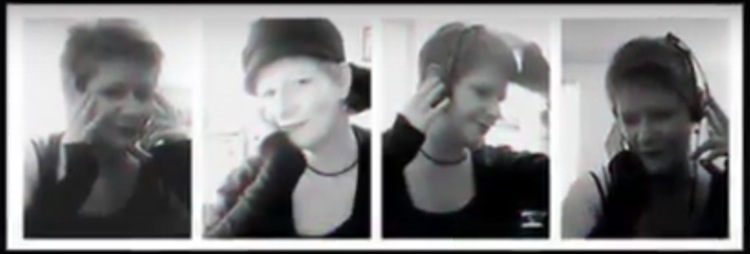“I am sociable, outgoing, quite extroverted, misanthropic at times yet other times quite philanthropic. I tend to contradict myself, wear a peculiar countenance from lack of sleep, despise insipid conversations, I get on my own nerves, spell like a fifth grader, use my diagnosis of florid ADHD as an excuse for the loquacious tendencies I can’t seem to control. I was born with red hair, I still have red hair. I have an opened mind with a critical eye. I am deeply affected by art and pathos. I have a pernicious suspicion toward bigots. I do not sing in the shower. I am sometimes goofy, serious, satirical, sometimes silly and extroverted but rarely do I possess the temperament of a potato.” — Ginger Eades
Arts, Media & Culture News with 'tude
This blog published under a Creative Commons license
an ArtsJournal blog


There is an irony in advertising oneself as an outlaw poet. Outlaws that advertise their outlawry don’t last long. They are soon “imprisoned,” or if not, merely found to be phonies. It’s the difference between being an outlaw and assuming a stylistic persona — a real problem for both the beats and the hippies — the sense that the outlawry of writers ranging from Kerouac to Ginsberg was a little too self-conscious, a bit too constructed.
This problem derived from mimicry of class and race, like the beats’ construction of themselves as the down-trodden white Negros of bebop. Or the good ol’ boys of radio star folk music with country twangs somehow formulated by growing up in middle-class Brooklyn or Minnesota. The real outlaws, like blacks or poor Dust Bowl whites, were seldom in a position to advertise their outlawry, and if they did, mainstreamers posing as outlaws were quick to jump in with a mimicry to corner the market. One is left wondering who the real outlaws are today.
Point taken. I don’t know who the real outlaws are today, although I could name a few literary possibilities: David Britton, author of “Lord Horror,” published in 1989 (for which he served time in prison; that was “the first book to be banned in England since Hubert Selby Jr’s ‘Last Exit to Brooklyn’ in 1968”). Britton’s follow-up books, “Motherfuckers: The Auschwitz of Oz” and “Baptized in the Blood of Millions,” are further proof of his outlaw status. (See ‘Not the Yellow Brick Road” and Keith Seward’s “Horror Panegyric”: http://www.artsjournal.com/herman/2008/03/not_the_yellow_brick_road_1.html.)
Britton’s writing partner and co-founder of Savoy Books in Manchester, U.K., Michael Butterworth is another literary outlaw. (Have a look here for the story of Savoy Books: http://www.savoy.abel.co.uk/1book.html ) And now Butterworth has a memoir coming out. (The Blue Monday Diaries: In the Studio with New Order http://www.amazon.com/Blue-Monday-Diaries-Studio-Order/dp/0859655466/ref=sr_1_1?s=books&ie=UTF8&qid=1455113702&sr=1-1&keywords=michael+butterworth )
Another outlaw is Heathcote Williams, whose Royal Babylon (The Criminal Record of the British Monarchy, narrated with montage by Alan Cox) on Youtube https://www.youtube.com/watch?v=jIukrdRhnpw is among many MANY of Williams’s polemical investigations.
I can tell you that one of the real outlaws is definitely NOT Bob Dylan, whom Williams calls an imposter, not only for the theft of Dylan Thomas’s name, but because he “would prove as keen as mustard to have his voice serve any and every American corporation.” (See the reasons for Williams’s contempt: http://www.artsjournal.com/herman/2015/06/of-poetry-and-fakery-cultural-theft-and-stolen-identity.html ). Williams recently took on editorial duties as editor of IT: The International Times, clearly something of an outlaw publication: http://internationaltimes.it/it-50th-re-launch-party/ Though he rarely leaves his lair in Oxford, here he is at the party (holding the “rent strike now” poster): http://internationaltimes.it/wp-content/uploads/heth-1.jpg
.